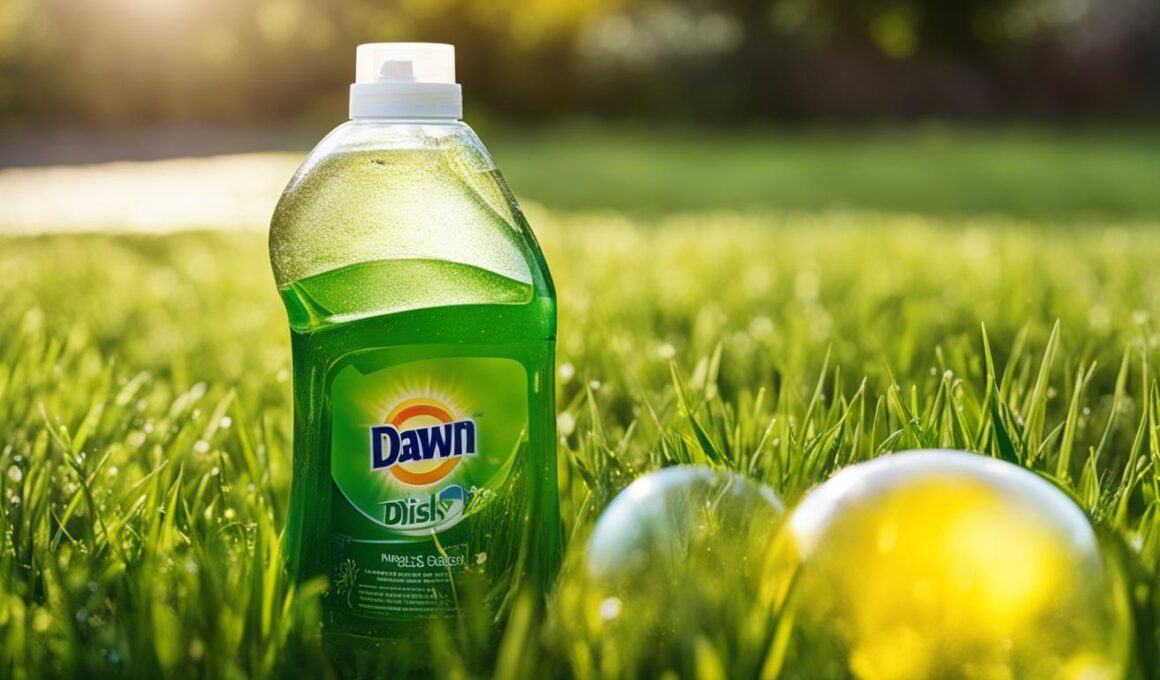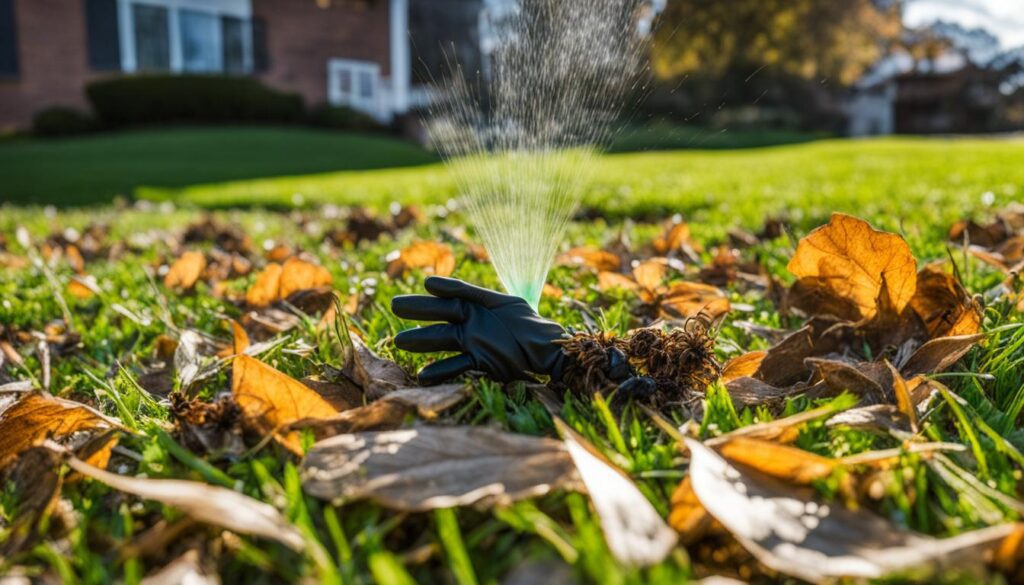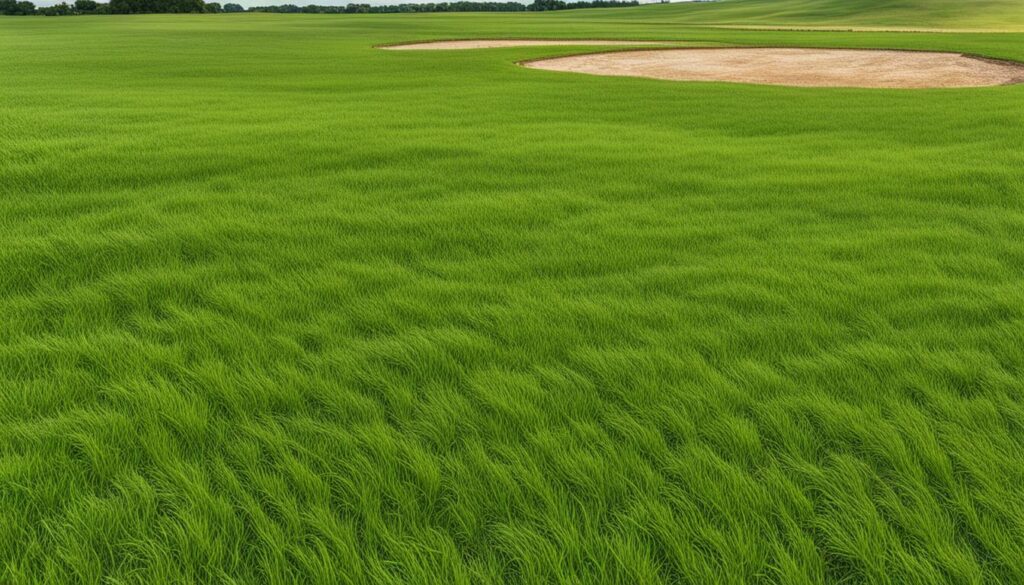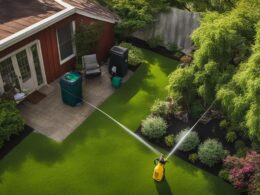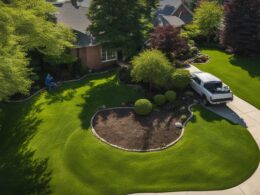If you’ve been struggling with lawn pests and are looking for an effective solution, you may have come across the idea of using dish soap. Dawn dish soap, in particular, is a popular choice for homeowners when it comes to tackling pesky insects in the lawn. But does using Dawn dish soap kill grass as well? Let’s find out!
Key Takeaways:
- Dish soap can be effective in killing lawn pests, but it can also harm grass if not used properly.
- Dish soap works by disrupting the cell membranes of pests, suffocating them, and dehydrating them.
- Using undiluted dish soap or not rinsing it off can strip away the protective oils on grass, leading to dryness and death.
- To use dish soap safely on your lawn, dilute it with water, add a bit of vegetable oil, and apply it sparingly.
- If you’re concerned about the potential harm to grass, there are safer alternatives such as insecticidal soaps and organic pesticides.
How Does Dish Soap Kill Lawn Pests?
Dish soap is an effective method for eliminating lawn pests such as soft-bodied insects and grubs. It achieves this by employing suffocation and dehydration as its primary mechanisms of action. When applied to pests, dish soap disrupts their cell membranes, resulting in suffocation. This is particularly effective against soft-bodied insects like grubs, as the soap can drown them, coating their bodies with a fluid that ultimately suffocates them.
In addition to suffocation, dish soap also has the ability to dissolve the waxy coating found on an insect’s exoskeleton. This coating acts as a protective barrier against dehydration, so by removing it, dish soap accelerates the desiccation process. As a result, lawn pests that come into contact with the soap are more prone to dehydration, leading to their eventual demise.
While the precise mechanism of action may not be fully understood, researchers recommend diluting dish soap with water and even adding a small amount of vegetable oil to enhance its effectiveness. Some commercially available soaps specifically target the nervous systems of plant-eating insects while sparing beneficial insects, making them a safer option for pest control.
To further enhance the effectiveness of dish soap as a lawn pest control method, high-pressure sprays can be used to wash off insects from plants after applying the soapy water. This helps to physically remove and dislodge pests, further reducing their presence in the lawn.
By utilizing dish soap’s suffocating and dehydrating properties, alongside proper application techniques, you can effectively combat lawn pests and maintain a healthy, pest-free lawn.
Does Dish Soap Kill Grass?
Dish soap can indeed kill grass if used in high concentrations or if not rinsed off properly. The chemical constitution of dish soap, particularly ingredients like sodium lauryl sulphate, sodium hydroxide, and potassium hydroxide, can strip away the protective oils and dry out the grass.
The extent of damage to the grass depends on the chemical composition of the dish soap used. Dish soaps contain synthetic chemicals called surfactants that break down organic matter, including the oils on grass.
Diluting dish soap with water and vegetable oil can help reduce its impact on grass.
It is important to rinse off the mixture after a short period of time to prevent damage to the grass.
Using dish soap in high concentrations or without proper rinsing can lead to dehydration and death of the grass. To protect your lawn, it is crucial to dilute dish soap with water and only use it sparingly.
By understanding the chemical constitution of dish soap and taking precautions, you can effectively manage lawn pests without causing harm to your grass.
How to Safely Use Dish Soap on Your Lawn
Using dish soap on your lawn can be an effective method for controlling lawn pests, but it’s important to follow the proper steps to ensure the safety of your grass. By following these guidelines, you can safely use dish soap to tackle lawn pest infestations.
Check the Weather Forecast
Before applying dish soap to your lawn, check the weather forecast. It’s best to choose a day without rain, as rain can wash away the soap before it has a chance to be effective. Pick a dry day to ensure that the dish soap can work its magic on the pests.
Dilute the Mixture
To avoid harming your grass, dilute the dish soap with water. Mix a small amount of dish soap with a larger amount of water to create a diluted mixture. This will help reduce the concentration of the soap and minimize any potential damage to your lawn.
Apply in the Morning or Evening
When applying the dish soap mixture to your lawn, it’s best to do so in the morning or evening when the temperature is not too high. Avoid applying the mixture during the hottest part of the day, as the heat may intensify the soap’s effects on your grass.
Test on a Small Area
Before treating your entire lawn, it’s important to test the dish soap mixture on a small, inconspicuous area of your lawn. This will allow you to observe how your grass reacts to the soap and ensure that it does not cause excessive damage. If the test area shows any signs of negative effects, consider using an alternative method or product.
Coat the Insect’s Body
When applying the dish soap mixture, focus on coating the body of the lawn pests. This will help suffocate and eliminate the insects more effectively. Ensure that each pest is thoroughly coated with the mixture for maximum impact.
Rinse with Water
After allowing the dish soap mixture to sit for about an hour, rinse your lawn with water to remove any residual soap. Rinsing will help minimize the risk of damage to your grass and ensure the safety of your lawn. Use a gentle stream of water to thoroughly rinse the treated areas.
Repeat if Necessary
If your lawn pest problem persists, it may be necessary to repeat the dish soap treatment for a few days. However, it’s important to carefully monitor the effects on your grass and adjust the concentration and frequency of application accordingly to avoid excessive harm.
By following these steps, you can safely use dish soap on your lawn to control pesky insects without causing significant damage to your grass. Remember to exercise caution and observe the effects on your lawn to ensure the best results.
Safer Alternatives to Dish Soap for Lawn Pests
If you are concerned about the potential harm that dish soap can cause to your grass, there are safer alternatives available. Insecticidal soaps are specifically formulated for use on plant and lawn insects and can effectively control pests without causing harm to your grass. These soaps contain ingredients like potassium hydroxide and sodium hydroxide, which are designed to be safe for use in lawns and gardens. By using insecticidal soaps, you can protect your lawn from pests while ensuring its health and vitality.
Another option to consider is low-toxic pesticide soaps, which are particularly useful for delicate insects such as whiteflies and spider mites. These soaps target the waxy exterior of the insects and effectively wash away any mold or honeydew sap. They are a gentle yet effective alternative to dish soap for controlling lawn pests.
If you prefer organic options, there are organic pesticides available that provide a safer alternative to dish soap. Neem oil, for example, is a natural pesticide derived from the neem tree and is known for its pest control properties. It is effective against a wide range of lawn pests and does not harm the grass or the environment. By opting for organic pesticides, you can maintain a healthy lawn while keeping pests at bay.
By exploring these safer alternatives, you can effectively control lawn pests without risking the health of your grass. Whether you choose insecticidal soaps, low-toxic pesticide soaps, or organic pesticides, these options provide a safer way to maintain a pest-free lawn. It’s important to always follow the product instructions and guidelines for application to ensure optimal results. Protect your lawn and enjoy a lush, vibrant outdoor space using these safer alternatives to dish soap.
Conclusion
Dish soap can be a cost-effective solution for controlling lawn pests, but it is crucial to exercise caution to prevent harm to your grass. While it has the ability to kill these pests, it can also strip away the protective oils and waxes on the grass blades, leading to dryness and eventual death. To mitigate damage, it is advisable to dilute dish soap with water and rinse it off after a short period of time. However, if you are concerned about the potential risks, there are safer alternatives available.
Insecticidal soaps, low-toxic pesticide soaps, and organic pesticides are formulated to be safe for lawns and gardens while effectively managing pests. By opting for these alternatives, you can maintain the health of your grass without compromising its longevity. It is important to select the right product and adhere to proper application methods to achieve successful results. With proper lawn care and the use of safer alternatives, you can effectively manage lawn pests, ensuring the well-being of your grass.
Remember, maintaining a healthy and vibrant lawn requires careful consideration of the products and methods you employ. By making informed choices and prioritizing the health of your grass, you can strike a balance between pest control and lawn care, creating an environment that thrives.
Will Using Dawn Dish Soap to Kill Grass Harm my Lawn if There is Dog Poop Present?
Using Dawn dish soap to kill grass if there is dog poop present may harm your lawn. The chemicals in the soap can be detrimental to grass and other plants. It’s important to consider alternative solutions for dog poop and grass care to maintain a healthy lawn.
FAQ
Does dish soap kill grass?
Yes, dish soap can kill grass if used in high concentrations or not rinsed off properly. The chemicals in dish soap can strip away the protective oils and dry out the grass.
How does dish soap kill lawn pests?
Dish soap kills lawn pests by disrupting their cell membranes and suffocating them. It can also dissolve the waxy coating on an insect’s exoskeleton, leading to dehydration and death.
How to safely use dish soap on your lawn?
To safely use dish soap on your lawn, dilute it with water and mix in a small amount of vegetable oil. Apply the mixture to the affected areas, rinse it off after a short period of time, and repeat if necessary.
Can dish soap harm grass?
Yes, dish soap can harm grass if used in high concentrations or not rinsed off properly. It can strip away the protective oils and dry out the grass, leading to damage or death.
Are there safer alternatives to dish soap for lawn pests?
Yes, there are safer alternatives to dish soap for controlling lawn pests, such as insecticidal soaps, low-toxic pesticide soaps, and organic pesticides. These alternatives are specifically formulated to be safe for use on lawns and gardens.





